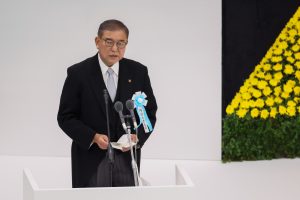Japan’s National Memorial Ceremony for the War Dead took place on August 15, 2025 at the Nippon Budokan hall. This year, the ceremony marked the 80th anniversary of the end of World War II, when Emperor Hirohito declared Japan’s surrender in a radio broadcast to the nation on the same day in 1945.
About 3,432 attendees, including family members of the war dead, attended to honor the more than 3 million Japanese military personnel and civilians who died during the war, including victims of the atomic bombings in Hiroshima and Nagasaki.
Headlining the event was Japan’s Prime Minister Ishiba Shigeru, who gave a speech at the ceremony. Remarks from Japanese leaders about the history of World War II are always closely scrutinized, given the unresolved historical issues that plague Japan’s relations with its neighbors, particularly China and South Korea.
How did Ishiba approach war remembrance?
“We must never again repeat the horrors of war. We must never again lose our way. We must now take deeply into our hearts once again our remorse and also the lessons learned from that war,” Ishiba said in his speech. This is the first time a prime minister has used the phrase “remorse” at the memorial ceremony in 13 years.
The phrase was last mentioned in 2012, by then-Prime Minister Noda Yoshihiko at the 67th anniversary. Notably, Noda is from the Democratic Party of Japan; after the Liberal Democratic Party returned to power, prime ministers such as Abe Shinzo, Suga Yoshihide, and Kishida Fumio did not mention “remorse” in their speeches. (Abe had used the word in his speech in 2007 during his first term, but not in later terms). Therefore, Ishiba’s use of the phrase deviated from his recent LDP predecessors.
In his speech, Ishiba also stressed Japan’s commitment to peace. “No matter how much time passes, we will hand down across generations the sorrowful memories of the war and our resolute pledge to renounce war, and we will remain steadfast in our actions to foster lasting peace,” he declared.
Expressions like “never repeat the ravages of war” have been used by prime ministers since 2015. “These expressions describe consequences, but [Ishiba’s reference to a] ‘resolute pledge not to wage war’ emphasizes that war itself must not be initiated,” an aide to Ishiba explained.
Ishiba also stressed the importance of ensuring that future generations understand “the sorrowful wartime memories,” a reference to historical education. He reportedly had told close associates that the 80th anniversary will almost certainly be the last milestone year before the war generation fades into history. Ishiba is probably influenced in this line of thinking by former Prime Minister Tanaka Kakuei, whom he regarded as a political mentor and shared similar thoughts.
Ishiba’s worry about the lessons of war being forgotten makes sense. In fact, more than half of the participants at the 80th anniversary ceremony were born after the war, and for the first time, no participants were spouses of the war dead.
As the generation with direct experience of the war disappears, the risk is that it will fade from memory. A survey by the Japanese Red Cross Society found that 25.8 percent of participants did not know when the war ended (August 15, 1945), while 21.7 percent and 27 percent, did not know the when the atomic bombs were dropped on Hiroshima (August 6, 1945) and Nagasaki (August 9, 1945), respectively.
Yet Ishiba’s remarks also reflect a balancing act, as he tried not to antagonize more conservative members of his party.
Despite expressing remorse, Ishiba did not explicitly apologize and did not directly mention Japan’s invasion and aggression, or the suffering of other nations. Also, he chose not to issue a Cabinet-endorsed statement, unlike past leaders who released them for the 50th, 60th, and 70th anniversaries. This gives his expression of “remorse” more a personal feel, rather than being the official position of the Japanese government.
The same day that Ishiba spoke at the ceremony, his agriculture minister, Koizumi Shinjiro, along with former economic security minister Kobayashi Takayuki and right-wing lawmakers, prayed at the Yasukuni Shrine. The shrine honors 2.5 million war dead, including convicted war criminals. It has been seen as a symbol of militarism by Japan’s Asian neighbors and a source of diplomatic friction.
Koizumi became the first minister confirmed to have visited Yasukuni Shrine since Ishiba took office. His father, Koizumi Junichiro, visited the shrine every year when he was prime minister, which was also criticized by Chinese and South Korean officials.
Ishiba himself chose not to visit the controversial shrine, but he sent a “religious ornament” as an offering.
Ishiba’s speech conveyed that deep reflection on the war can help prevent another one – and he stressed the need to pass down this reflection to younger generations. His choices during the 80th anniversary probably reflected a strategic attempt to balance competing imperatives: conveying his personal views toward the war (by using the phrase “remorse”), appeasing the LDP’s conservative members and support base (by not issuing a Cabinet-endorsed statement and sending a ritual offering to the Yasukuni Shrine), and at the same time, avoiding more serious diplomatic frictions with Asian neighboring (by staying away from the Yasukuni Shrine himself).

































